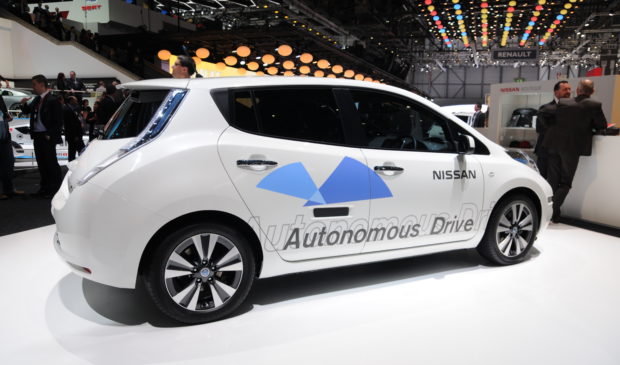State lawmakers veer into robot car conversation
Thursday, December 8, 2016 by
Caleb Pritchard The transportation buzz around the state Capitol during the buildup to the 85th Texas Legislature has included word of statewide ride-hailing regulations, toll road reform and now – perhaps inevitably – autonomous vehicles.
The House Transportation Committee on Wednesday hosted a panel of experts and stakeholders to discuss the development of self-driving car technologies and consider what role public policy could play once the long-anticipated age of robot cars arrives.
Rep. Joe Pickett (El Paso) chairs the committee. The 11-term lawmaker is himself no small fan of novelty vehicles, as demonstrated by the link on his personal web page to a separate site featuring photographs of his vintage car and truck collection. The Austin American-Statesman’s Ben Wear also reported on Wednesday that Pickett recently installed a Ford Model T inside his Capitol office.
However, on Wednesday, the El Paso Democrat’s focus was on vehicles not yet realized.
“I’m really excited about you being here,” Pickett told the panel of speakers, who represented the Texas A&M Transportation Institute (known as TTI); General Motors; the Alliance of Automobile Manufacturers; and the Self-Driving Coalition for Safer Streets, an advocacy organization founded in April by Ford Motor Company, Volvo Cars Group, Uber, Lyft and Google.
Pickett invited the speakers to talk about their areas of expertise, including the progress of development on “the space-age vehicles, the George Jetson mobiles and all that stuff I’m real interested in.”
He also indicated that there would not be much by way of heavy legislative action concerning autonomous vehicles in the upcoming session.
“I don’t see a big, big, big change tomorrow. But I want to get a little ahead of the curve,” he said.
Ginger Goodin, director of TTI’s Transportation Policy Research Center, delivered on Pickett’s charge by illuminating the current framework of regulation for highly autonomous vehicles (known as HAVs), or vehicles that operate without human guidance most, if not all, of the time.
She noted that HAVs could potentially lead to safer streets and highways while at the same time increasing mobility options for people who are incapable of driving on their own.
“However, there is no established method for evaluating whether these vehicles are safe and no standard for how safe they need to be to operate on public roads,” Goodin told the committee. “So that’s the challenge you guys have.”
In September, the National Highway Traffic Safety Administration published guidelines offering advice on HAV policy, including a model state regulatory framework.
That lengthy document recommends that states maintain their traditional sovereignty over licensing drivers, regulating insurance, inspecting vehicles and enforcing traffic laws.
“NHTSA also suggests that states review laws with an eye to removing impediments to automated vehicle testing, deployment and operation, and suggests that states standardize and maintain road infrastructure including signs, traffic signals and pavement markings to further enable safe operation of these vehicles,” Goodin said.
“So who gets the traffic ticket?” Pickett asked, drawing mild chuckles from the room, which he met with protestations of his sincerity.
“I think that’s one of many questions that are still before us as it relates to this technology,” Goodin replied.
Chan Lieu of the Self-Driving Coalition for Safer Streets introduced further nuance to the discussion by describing Level 4 and Level 5 autonomous vehicles.
The former, he said, remain technologically imperfect and can be thrown off without the proper infrastructure or by inclement weather, such as when snow covers a road. Lieu described Level 5 autonomous vehicles as “the holy grail” – vehicles that can operate autonomously in all conditions but that have not yet been technologically realized.
In written testimony distributed to the committee members, Lieu urged the lawmakers to “promote competition in the automated vehicle market, among traditional auto manufacturers as well as newer entrants to the market and ride-sharing services.”
Leighton Yates of the Alliance of Automobile Manufacturers said his group agrees with the distinction of state and federal roles when it comes to rules regarding HAVs. He went further, saying, “States should focus on removing barriers to testing the deployment of highly automated vehicles.”
When asked for specific examples of such barriers, Yates conceded that most states do not have laws against testing HAVs.
The committee’s discussion lasted a little over an hour, until Pickett gaveled the committee meeting to a close with no clear indication of when the sea change of robot cars might finally sweep across Texas.
Photo by Norbert Aepli made available through a Creative Commons license.
The Austin Monitor’s work is made possible by donations from the community. Though our reporting covers donors from time to time, we are careful to keep business and editorial efforts separate while maintaining transparency. A complete list of donors is available here, and our code of ethics is explained here.
You're a community leader
And we’re honored you look to us for serious, in-depth news. You know a strong community needs local and dedicated watchdog reporting. We’re here for you and that won’t change. Now will you take the powerful next step and support our nonprofit news organization?









